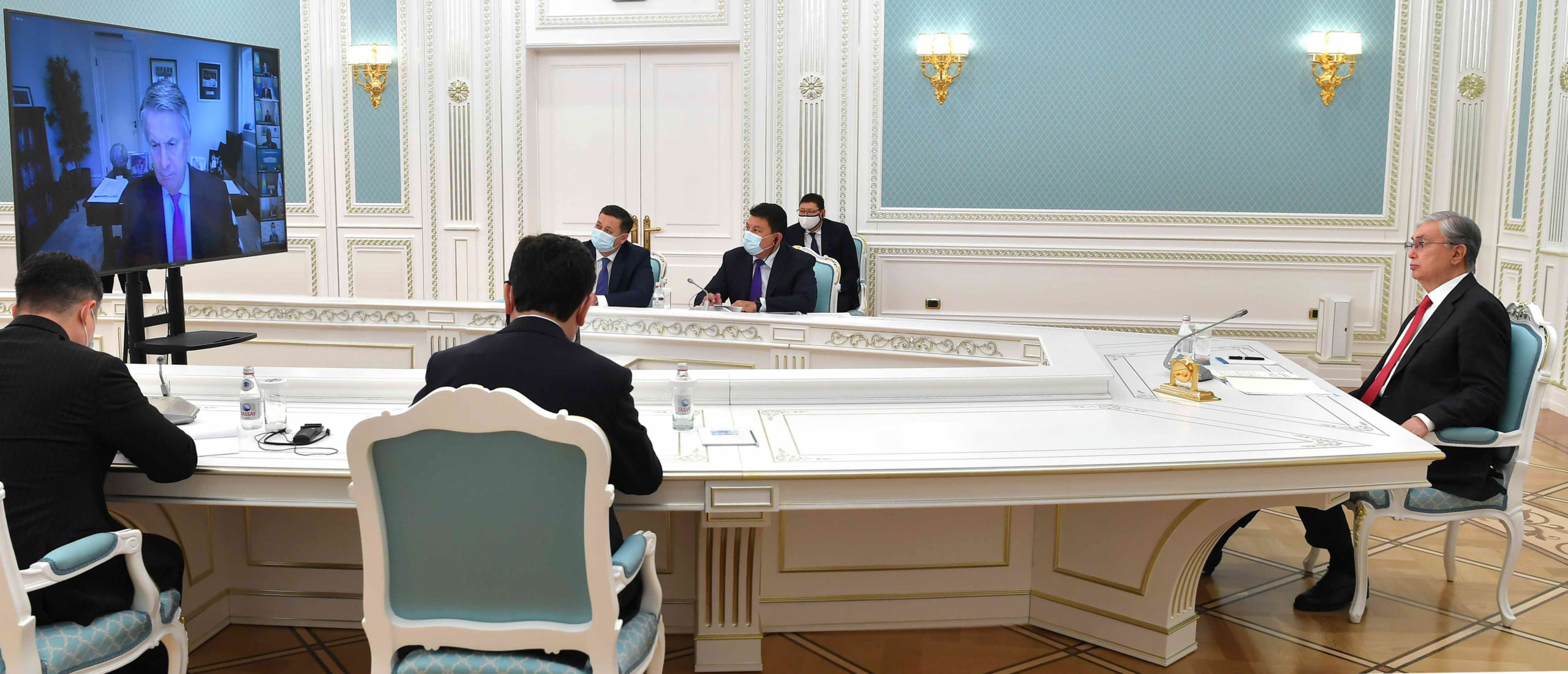NUR-SULTAN – Kazakh President Kassym-Jomart Tokayev addressed the meeting of the Foreign Investors’ Council that this year sought solutions to restoring economic and investment activity in Kazakhstan amid the coronavirus pandemic, and developing and boosting the investment attractiveness of the country’s oil and gas sector.

During the meeting. Photo credit: Akorda press service
The Foreign Investors Council was established in 1998 to ensure dialogue between the Kazakh government and foreign investors and discuss issues investors might face. The council consists of 37 foreign companies as well as top Kazakh officials.
Opening the forum, Tokayev said that the global pandemic negatively impacted almost all areas and noted the importance of joining efforts to overcome its consequences.
A set of “unprecedented measures” taken in the aftermath of the first COVID-19 wave to support businesses and population will help reduce negative consequences of the crisis and avoid severe economic recession, said Tokayev.
He said there is a need for fundamental changes and reforms to boost investment attractiveness, ensure transparency and predictability of government policies.
Tokayev suggested creating new investment instruments. In doing so, a strategic investment agreement was developed to support major investors. This agreement entails a set of state support measures including tax preferences, concessional financing, guaranteed purchases from the state, and export support.
He also stressed the importance of improving conditions for doing business in the country. The government, he said, will prepare a new regulatory system. All control and supervisory, permitting and other regulatory instruments will undergo a large-scale audit.
Tokayev also told the virtual gathering about the development of a new Environmental Code based on the best approaches used in OECD countries.
“Enterprises that have implemented these technologies will be exempted from emission fees. I would like to note that not every country has such a mechanism where the state shares environmental costs with companies. In fact, this is a large scale public private partnership project. We consciously selected this approach. We expect businesses to fully comply with their part of the agreements,” said Tokayev.
The draft code has been recently adopted by the Majilis, lower chamber of the Kazakh Parliament, and was sent to the Senate, an upper chamber of the Kazakh Parliament.
The document has several major principles, including the ‘polluter pays and fixes’ principle that will control large company emissions with fines and responsibility for environmental damage, and the principle obliging industrial enterprises to undergo a technological audit to be offered the best available technologies (BAT) to produce fewer emissions.
Development of IT
Kazakhstan can also benefit from opportunities in the IT sector, said Tokayev, which gave a powerful boost to rapid development of the digital economy amid the pandemic.
But the development of Kazakhstan’s IT industry, where the country plans to attract nearly 500 billion tenge (US$1.2 billion) in the next five years, needs serious support from global technology companies.
“Currently, around six percent of global (digital) mining is concentrated in Kazakhstan. The development of IT, engineering and other high-tech fields also offer significant export opportunities. We plan to attract investments from major global players in cloud computing and platforms. Preparations have begun to build four mega data centers in Nur-Sultan, Almaty, Shymkent and Atyrau. These are tremendous computing capacities that will be located on a major international information superhighway,” he said.
Opportunities in the pharmaceutical industry
Tokayev emphasized the importance of developing the domestic pharmaceutical industry.
Kazakhstan seeks to bring the share of domestic pharmaceutical production up to 50 percent by 2025 along with rapid development of medical equipment and consumables production. These areas are open to investment, he said, and such projects will receive full support from the state.
Oil and gas sector
The oil and gas sector, which has supported the nation’s steady economic growth over the years and served as a driving force in attracting foreign investments, helped build new sectors of the economy, such as oil refining, petrochemicals, oilfield services, pipeline and maritime transport.
The industry, however, will have to adapt to new realities, said Tokayev, given the lowering demand for oil and declining investment attractiveness, and government policies will have a key role in this.
Tokayev stressed the importance of timely completion of major oil and gas projects at the country’s Tengiz, Karachaganak and Kashagan fields. He instructed the government to transition to the full-scale development of Kashagan and gear the construction of the gas processing plant in the field.
Increasing investment attractiveness of geological exploration also requires attention, said the President. He told the government and oil and gas companies to work together to improve the industry’s regulatory framework, consider current realities and the industry’s future development prospects.
“The Ministry of Energy should consider the possibility of providing special conditions for the production and export of oil and gas for companies willing to invest in refining projects,” said Tokayev noting the importance of environmental protection and the development of the low-carbon economy.
He reassured those in attendance that all suggestions voiced at the meeting will be thoroughly considered by the government.
“The government will work to address the problems that were brought up today by the participants of today’s important meeting. I believe we need a breakthrough in our decision making process. As president of the country, I will closely monitor the decision making and the course of interaction between our large partners and friends,” concluded Tokayev.
